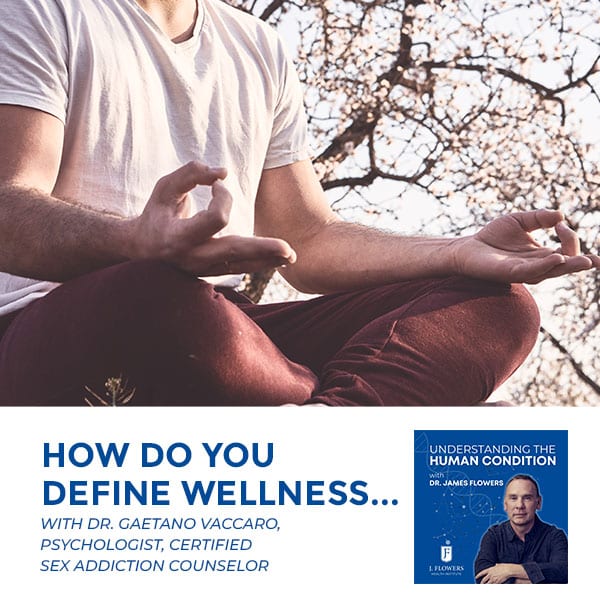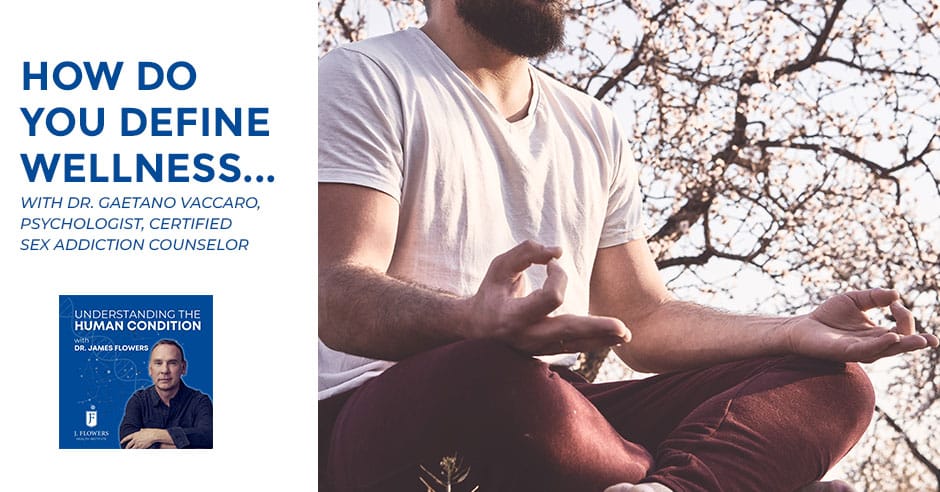
How would you define wellness?
MY ANSWER:
Wellness is more than a physical condition, and so much more than just the absence of illness or disease.
WELLNESS IS A STATE OF BEING.
I think about it as the body-mind (because body and mind are reciprocally linked) being in alignment with your behavior and habits.
And if you are truly committed to that state of being, then you will establish a daily, weekly, or monthly practice of those behaviors.
And, if you strive to be disciplined and consistent with that practice, it can contribute to your quality of life. It can help sustain mental health and physical vitality and ultimately, I believe that this mental and physical practice will promote longevity.
—
Watch the episode here
Listen to the podcast here
How Do You Define Wellness…With Dr. Gaetano Vaccaro, Psychologist, Certified Sex Addiction Counselor
I am so excited to have my very good friend Dr. Gaetano Vaccaro with us from California. Dr. Gaetano Vaccaro is a Licensed Clinical Psychologist. He’s also a Certified Sex Addiction Therapist. Otherwise known as a CSAR. Dr. Vaccaro has over 30 years of experience in the addiction and recovery industry as a psychotherapist, executive director, clinical director, and consultant for program design and a workshop facilitator. Dr. Vaquero is the national clinical advisor for Constellation Behavioral Health.
He also maintains a private practice in Palm Springs, California, and he has presented at the 2024 West Coast in Cape Cod Symposia on addictive disorders as well as many other conferences throughout his years of practice. Dr. Vaquero is a proficient facilitator and he develops workshops and retreats on personal growth and human development. Welcome, Gaetano Vaccaro.
Thank you. James. How are you?
I’m doing great. It’s so good to see you. How’s everything out in California?
It’s great. This is the time of year when everybody shows up here because it’s just gorgeous. It’s beautiful.
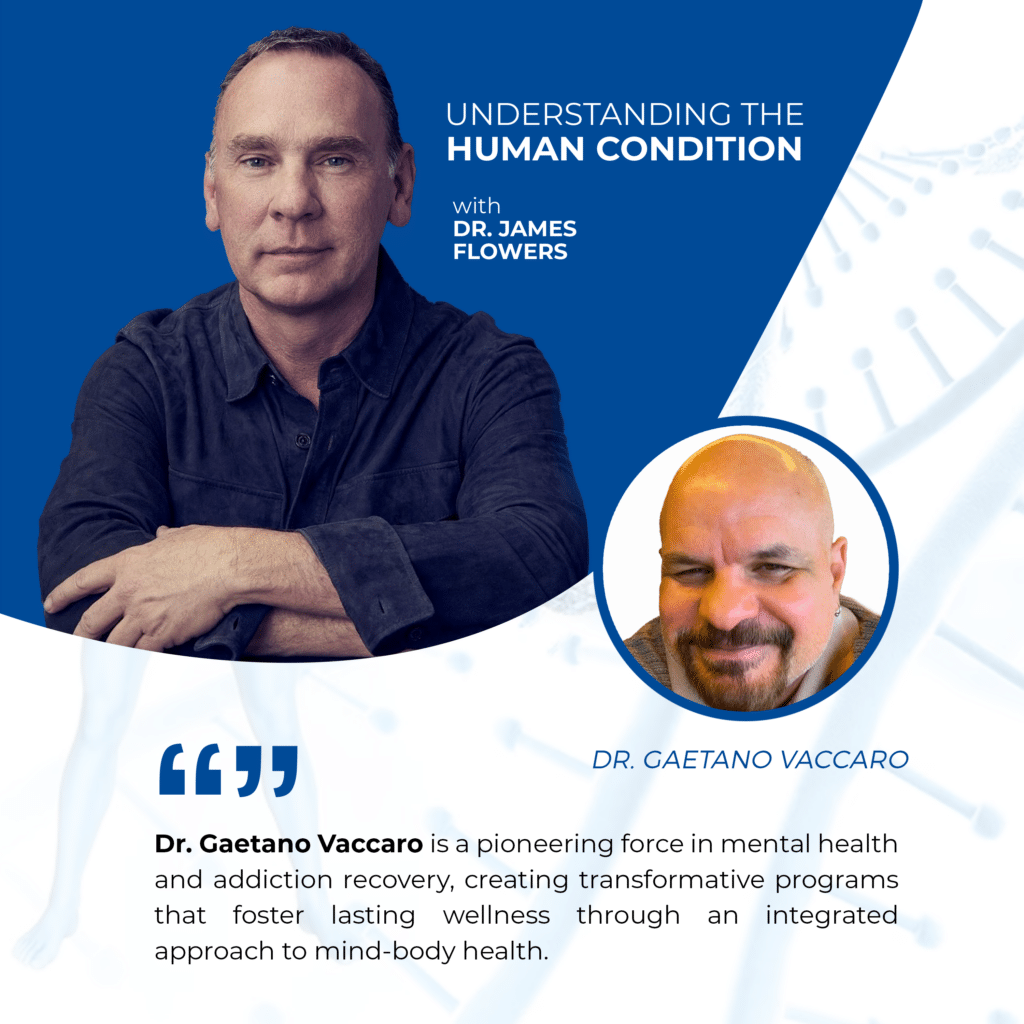
Has the weather calmed down and heat wise in Palm Springs?
It was like 60 degrees. You can go out and do a hike.
That is so nice. It has not rained in Houston in probably three and a half months and suddenly, it’s raining and a little bit cooler and cool front blew through. Hopefully, it’ll stick and will be like this for a while.
I’m going to get out and ride my bike and start hiking and all that stuff you can’t do and it’s 110 degrees.
Increasing Focus On Wellness And Longevity
That’s exactly right, which also is a great segue to what you and I decided we wanted to talk about on this show, which is you’re going out to do some personal wellness. There’s so much talk and activity around the world of wellness and longevity. Every day, I look at my iPhone and the news pops up and there’s another program or someone talking about wellness and longevity. I wanted to ask you Dr. Vaccaro, or I’m going to call you Gaetano and you call me James in this episode. What is your idea? What do we talk about? What do we understand that wellness is?
One of the things before we go into wellness, I wanted to just clarify that the way for you and I to approach this James is to look at it not as experts or scientists but as explorers. This is a big field and very wide when we talk about what wellness means to us. There’s so many techniques and innovations that are connected to this idea of wellness and longevity. What I’d love for us to do is to come up with a couple of actionable steps.
As you and I have discussed, to begin the exploration into this field and start to collaborate on putting together programs because as you know, I’ve found it to be so important. I’ve had several family members who have been struggling with age-related cognitive decline. Luckily, they’re a little older than me. It’s one of those things where it shows up across the board these markers for what we consider to be illness and age-related illnesses. I would love for us to just be in the exploration phase of it.
I completely agree. Gaetano, here at J. Flowers Health Institute, we have a 360 degrees comprehensive diagnostic evaluation. We have an amazing wellness program for patients going through recovery from medical issues, mental health, or addiction issues. What you and I are even exploring more so is even more of a holistic approach to wellness. Again, we see these programs popping up. You and I have been talking about age-related decline of our cognitive abilities and our memory short-term, long-term, or things like that.
I don’t mind saying at all, I’m turning 60 years old, which I thought I still can’t believe. There are moments throughout the day that I can fill myself getting tired or more fatigued. Sometimes as the day goes on, my cognitive ability and short-term memory, I can see it and notice it declining. Not significantly at all but I’ll forget my keys or my iPhone on my desk or something like that. Sometimes even, Gaetano, I can’t recall a name immediately for someone that I just met 30 minutes ago or an hour ago. I’m like, “What was their name? I cannot remember.” That’s new.
You’re only willing to say your age because you’re younger than me. I’m not going to share that.
I don’t believe that for a minute. I don’t think I’m younger than you said.
You’re five years younger than me.
I cannot believe that. That is amazing. Talking about wellness. Look at that face. Who would think he’s five years older than me?
What’s fascinating too is the minute you turn like 64 and a half, then all this sudden, Medicare get all inundated. I’ve never felt so old in my life. Every time I turn around AARP. I remember it was a seminal event when I was looking at the AARP magazine and it came to you. Dylan was on the cover of AARP. I was like, “When did this happen?” We are a normally aging population in our generation.
It’s a shock. Teri Garr passed away. When I heard that news, I was like, “Oh my gosh. Teri Garr passed away. She was 79 years old.” I remember the 20-something year old or 30-year-old Teri Garr. I just couldn’t believe it. I was like, “Time is going by so fast.”
Wellness As A State Of Being
Close Encounters was just on and she was 35 in that movie. The part of it that I think is important when we talk about wellness because you have a lot of wellness programs. You and I talked about this and we agree that wellness is more than just a physical condition. It’s so much more than just the absence of illness or disease. Wellness is a state of being. I like to think about the idea of a mindset because there’s a lot of information about mindsets that are in popular psychology.
I’m a behaviorist and also, I’ve done a lot of body work in my lifetime, massage, reiki and those things. I think of the mind-body connection. I think of it as body mindset. The body and the mind are so intricately and reciprocally linked. We know this from things like somatic experiencing and other techniques that we use in psychology. It’s about how we get our mind and our body to be in alignment with our behavior and our habits.
I think of wellness as a state of being. Once you’ve entered into this committed to this state of being, then you start establishing daily or weekly or even monthly practices of behaviors. You have to strive to be disciplined and consistent in that practice for it to contribute to your quality of life. It’s this combination that you and I talked about all the time because we work with people who are struggling with physical illnesses and chronic pain but also people who are struggling with addiction.
Part of our career in addiction recovery about how to shift a person into a particular mindset in order for the behaviors to begin to develop. My friend Coyote Jackson, who’s a counselor and a personal coach and comes from a Christian and Buddhist background. He’s condensed it down into this idea of you have to be something and then you do something and you have something.
You have to start out with being. You have to start out with this state of being. If you want to change your life, you have to engage in this mindset of wellness before you engage in the behavior. Otherwise, as we know behaviors dissipate quickly. You can start a new habit and anticipate very quickly because if the behaviors aren’t motivated by commitment and desire and if you haven’t linked or reward or relief to them in the present. The behaviors dissipate very fast.
You have to start with the state of being. If you really want to change your life, you actually have to engage in this mindset of wellness before you engage in the behavior.
It takes 27 to 30 days to establish a new habit. We cannot reinforce that. That habit dissipates very quickly. The brain prefers things that we do a lot. When we go into workshops and do workshops, I always ask people, “What’s your daily practice?” Sometimes, they look at me dumbfounded like, “Am I supposed to have one of those?” “What is that?” In early recovery, they look at me and say, “I don’t have one.” I said, “You do,” but it could be a default practice by your default mode network.
I said, “If you’re coming out of an addiction, how many of you were daily users?” They raise their hands because that was their daily practice. Your brain thought that was important and preferred it over everything else. Now, in recovery, we have to figure out what daily practice you’re going to do that’s about health and wellness. They look at me with this, “I need one?”
“I have to exercise.” “I have to eat better.” “I have to live a life that is very different than what I was living.”
The question I asked for myself is, what is my daily practice? Do I have a wellness mentality, a wellness mindset? Examining, is my daily practice reflective of wellness and longevity or am I drinking three cups of coffee every morning? Am I not exercising? Am I staying up late watching Netflix and binge watching? Not that any of that’s bad, but is it congruent with health and wellness?
That’s right. What do you want for yourself? What do you want for your life? When you become stagnant and you’re binge watching until 1:00 or 2:00 in the morning and even midnight. You go to bed and you sleep till 8:00 or 9:00 and you get up and go through your day. You go to work, come home, and you do repeat. You’re not including that health and wellness. You’re not going to feel that health and wellness. I’m going to experience it.
You and I know as psychologists and behaviorists that our brain pays a lot of attention to stuff that we do habitually. The purpose of the brain is to create habits and then make them as automatic as possible as quickly as possible so we don’t have to think about them all the time. Which is why in reference to our earlier conversation about memory is that a lot of our behavior has become operationalized as procedural inside of our brain.
If we had to think about walking every time we tried to walk, which people have had to do that you’ve worked with when they’ve had injuries or illnesses. You’ve had to restructure that. It’s a big task for our brain to learn how to do a new procedure and to create a memory for that. I always tell people, it’s like, our brains trying to make all of our habits automatic as possible. We know the brain will never give up a habit that’s working. It only replaces it with a habit that works better and for a long time, it keeps both neuro-pathways open. It’s like that thing you get on your computer. It says, “Do you want to delete this file?” Where it let go of your addiction or any bad habit. It’s like, “Are you sure?”
That’s right and you seem to enjoy it.
You seem to enjoy it. You got a lot out of it. Do you want to let go of this? We don’t think you do.
Dr. Vaccaro’s Insights From Wellness Programs
What are you seeing when we’re talking about wellness and other programs and in programs that you’ve worked in Moonview and other types of programs? You went on a trip and you’ve been visiting some other programs. What are you seeing in the world of longevity and wellness these days?
It’s so fascinating because the approaches are varied. There are certain things that everyone agrees on that are baseline. I was again watching the Netflix special on the Blue Zones, how to live to be a hundred, the Secrets of Blues, which I just love. That study was so profound because it was longitudinal. They had gathered data over 15 to 20 years.
It had tons of data and it was very eye-opening about what we think the qualities of lifestyle are that promote longevity and wellness and where those places are. What was interesting about the special and his study was that a lot of them were very remote places like Okinawa. Places that you can’t live in, but Blue Zone is in Loma Linda, California. That’s off the 10 freeway between Palm Spring from LA.
You have a lot of vibrating noises there.
It’s true. It’s not known for its great air quality and yet at the Blue Zone. Part of what’s fascinating was when he was looking at what were these qualities that people had in those areas. Uniformly, a lot of the programs I’m looking at, they’re trying to say, “What are the things that are these basic qualities of health and wellness and promote longevity that people can institute easily into their life? How do we expand on that?”
I love the idea of regenerative medicine. You and I talked a little bit about that, but it’s a very broad field of science and medicine working on this cellular level to remit certain cellular deficiencies and also genetics. We do genetic testing to see if we’re susceptible to certain disorders. Generative medicine can be very powerful in looking at that. You and I know that the power of the mind is amazing and the placebo effect is the most studied effect in medicine because everything is scaled against it in clinical research and it’s real.
All the programs that I’ve seen, the primary focus and everybody’s got consistently about this is that we have to think about the mindset first because what you think about and your belief, your trust, and your faith in a particular regimen, whether it’s a medical regimen or not, is 80% of the effectiveness of the regimen.
I’ve seen that throughout my life. One of my own personal taglines is, if you see it in your mind and you believe it and you want it. You can achieve it. You can manifest it and create it. Sometimes the word manifests as overuse but I do believe that we can manifest it. I believe you’re right, it’s about 80% of the entire process. If we believe we are ill and we believe we don’t feel good. We maintain, “I’m never going to feel like I used to.” “I’m 60 years old.” “I’m 40 years old.” “My back hurts all the time.” “I can’t go out and exercise because it hurts.” That’s what’s going to happen.
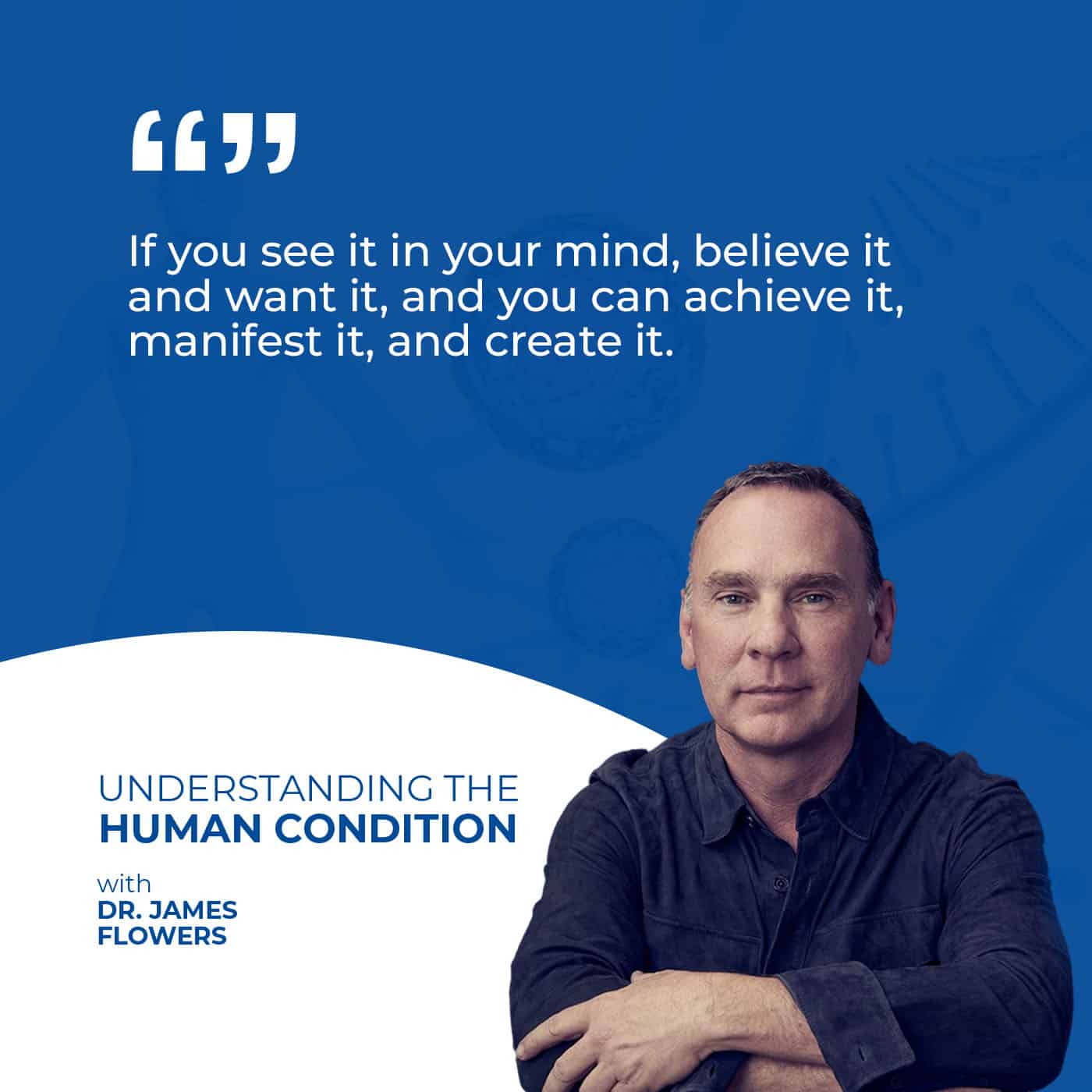
I remember many years ago, Bernie Siegel wrote the book, Love, Medicine and Miracles. He was an Oncologist. He was on the periphery of his day, talking about how mindset in his era. The frame of mind and how you thought about it and the placebo affect is being. He gave several anecdotes in his book about a little girl who was being treated and they ran out of alpha interferon. They put her on this camper solution. This oil of campers smell and this other solution, which is basically sailing, stand out the treatment and her body produced alpha interferon. The levels were the same throughout the course of treatment, which is the very complicated chemical compound for our brain to create.
I love the idea of, we have to get our mind and our brain in a certain alignment with, as you said, what we want and what swing towards. This is the dialectic of our brain, it can hold two conflicting things. It’s like, I want to be healthy but I want to eat pizza. Also, I have this addiction, I want to be a healthy person and every other area of my life. I’m trying to be healthy but I am addicted to opiates.
Another huge one, I think one of the biggest is, I want to be healthy. I want to be in recovery, but it’s hard. It’s just too hard. People give up by simply saying, “It’s too hard.” “I can’t run them.” “It’s not possible for me to run a marathon.” “It’s too hard to train.”
It’s interesting because dopamine is the chemical of motivation. It’s not a chemical of pleasure. It’s a big difference because when I say to people, “When you need to get motivated to behave, but it’s not fun.” It’s like, dopamine is not the chemical of fun. There are other chemicals like endorphins that happen. Oxytocin gives you the pleasure part and serotonin. What happens sometimes, motivation follows behavior in addiction recovery. You just do it or do it anywhere or act as if.
Sometimes, you just get into your habit pattern and commit to that practice. You get up in the morning, put on your shoes and go out running. Somewhere in the middle of it, you’re like, “This is pretty good.” We keep thinking that motivation has to precede behavior. It doesn’t. Sometimes we do the behavior and then the motivation is when we start thinking whether we’re going to get some reward or relief from that behavior.
That’s exactly right. I talked to people all the time. I’ve run 28 marathons. I was a lifelong runner. I used to be a runner and then I was a lifelong or a long time I ran marathons. I would talk to other people about training and they’re like, “I can’t motivate myself to get up.” I said, “Sometimes you just have to get up. You start running and there’s a window period of time.” All the sudden, motivation follows it. You’re going to be motivated once you start seeing the difference in your body and feeling the difference in your brain and your serotonin and everything else. You’re going to be motivated to continue to do that and people will always come back. The ones that did it and say, “I can’t believe I hated running and now I love it.”
I love the progression of, “I used to be a sprinter then I went to be a marathon.”
I ran the 200 and 400 and that’s it. Out of college, I was like, “I can run three miles. I’ll try that,” then started running longer. When I was in high school, my coach would say, “You’ve got to go train and you’re going to run a mile.” I’m like, “I am not running a mile. I will never run a mile in my life.” I was hard headed.
What you’re saying is so powerful too because the way the brain and the body works is that our brain is looking for two things, either reward or relief. Some kind of reinforcement. It’s very basic operant conditioning and what we tried to do is, we try to use classical conditioning. We just paired things together so it happened automatically. I’m going to get up in the morning and I’m going to go swim. I don’t want to. I’m going to do that. The practice helps to create the beingness of it.
It helps to reinforce that, “Yes, I’m a person who swims or I’m a person who runs.” It’s the mindset. When I think about people, especially people in recovery. It’s like, do you have a recovery mindset? Do you think about yourself and you envision the future of yourself in recovery? It’s hard because sometimes a person is so caught in the behavior that they can’t even envision what it is. I have several clients who are hockey players, which is fascinating because I live in the desert and we have a hockey team. Who knew? What’s fascinating is you have these 30-year-old guys who were super athletes, but it’s very hard for them to envision a future beyond hockey.
At 30, you’re old in hockey. It’s like they’re up against this thing of how do I reinvent myself? Also, when you get an injury, which happens a lot in sports. How do you not focus on, “I have this problem with my knee. I have this problem with my ankle.” How do you not be problem-focused? Whatever we focus on expands. You know this as an athlete. If you’re focusing on a part of your body that’s not functioning well and you’re focusing on that. You’re going to feel it more. It’s going to become worse.
If we focus on a part of our body that’s not functioning well, we feel it more. Whatever we focus on expands.
The Blue Zones
I completely agree with you. The thought can come first. The desire can come first and the motivation can come second, but I want to go back to something. I want to revisit the Blues Zone and all of these Blue Zones around the world and Loma Linda in particular. What did they find in these Blue Zones? What were some of the common themes around the world in the Blue Zones?
It’s so elegant the way that he put it together to see what was common because they were very diverse populations and ethnicities that he was reviewing. One of the things that he came up with is that every place where there’s Blue Zones where there’s longevity. There are several things that are common that can be complicated. One of them is the idea of moving naturally. This idea that it’s not just exercise specifically. It’s that people’s lifestyles involve a lot of movement. They were talking. They were riding bikes. They were mostly walking.
In some of the Blue Zones, they were walking uphill because that’s how the towns were like Okinawa and places like Sardinia. That’s how the towns were built. They were built on hills. There was this natural movement throughout their lifespan of moving their body and oxygenating their body. One common thing was movement. We’re human beings. We have to move.
The other thing was eating and diet. All of the eating and diet in each of these areas included certain types of foods that were very good for the body and did not have a lot of processed food. The basic thing he said, “Natural whole foods is important but also the quantity of food.” Most of the areas that he talked about had this mindset, like Okinawa. You stop eating when you’re 80% full. It’s this idea of moderation in our food consumption, but also mindfulness eating. Eating awareness.
Another big part was this idea of connection and community connection. He said probably 80% of longevity has to do with community and connection. If you are disconnected and we saw this during the pandemic. The more disconnected people were, the more depression and anxiety we saw. Also, a couple of years later, we saw things like physical illness because we were isolated. You’re not moving and not interacting with people. You’re very lonely.
This idea of connection and community was powerful. That was one of them. The last one was the one that I start with is outlook, having faith, purpose, and a sense of why we are doing something. All of the cultures he reviewed had some of a vocabulary in their language for purpose, for having some purpose to your life. A lot of them were faith-based communities or intentional communities, where you have this connection with each other and you have this same mindset. That’s why I focus on the things for health and wellness. It’s, what’s our mindset around it? Is it too hard? Is it even achievable?
After this study, at the very end of the documentary, he talks about they took all the stuff they learned from the Blue Zone and then they went to one town in Minnesota and convince the City Council, “Can we institute these things here and see if it makes a difference into the health and wellness of your population?” They did and it did. They created walking zones and those things where people were forced to connect with each other. They’re going to the center of the town and you’re running into people.
Also, the idea of love and connection as being so vital to how our internal body works. You and I know about Polyvagal Theory in the vagus nerve which connects a part directly with the brain. What we found is that the messages are not going from brain to heart. They’re going from heart to brain. The majority of the message is happening is the heart telling the brain how to view the world and what’s happening and what’s happening if we are having sadness or grief, how it’s affecting our blood flow.
The messages are not going from the brain to the heart. They’re going from the heart to the brain. The majority of the messages are happening in the heart, telling the brain how to view the world.
Anger and frustration even.
As a psychologist, I would think that mindset is the primary thing for wellness. It’s much more important. Even any of the medical things we do are going to be great and a great ancillary connection to that. If we don’t get our head right first, a lot of that is not going to make a difference.
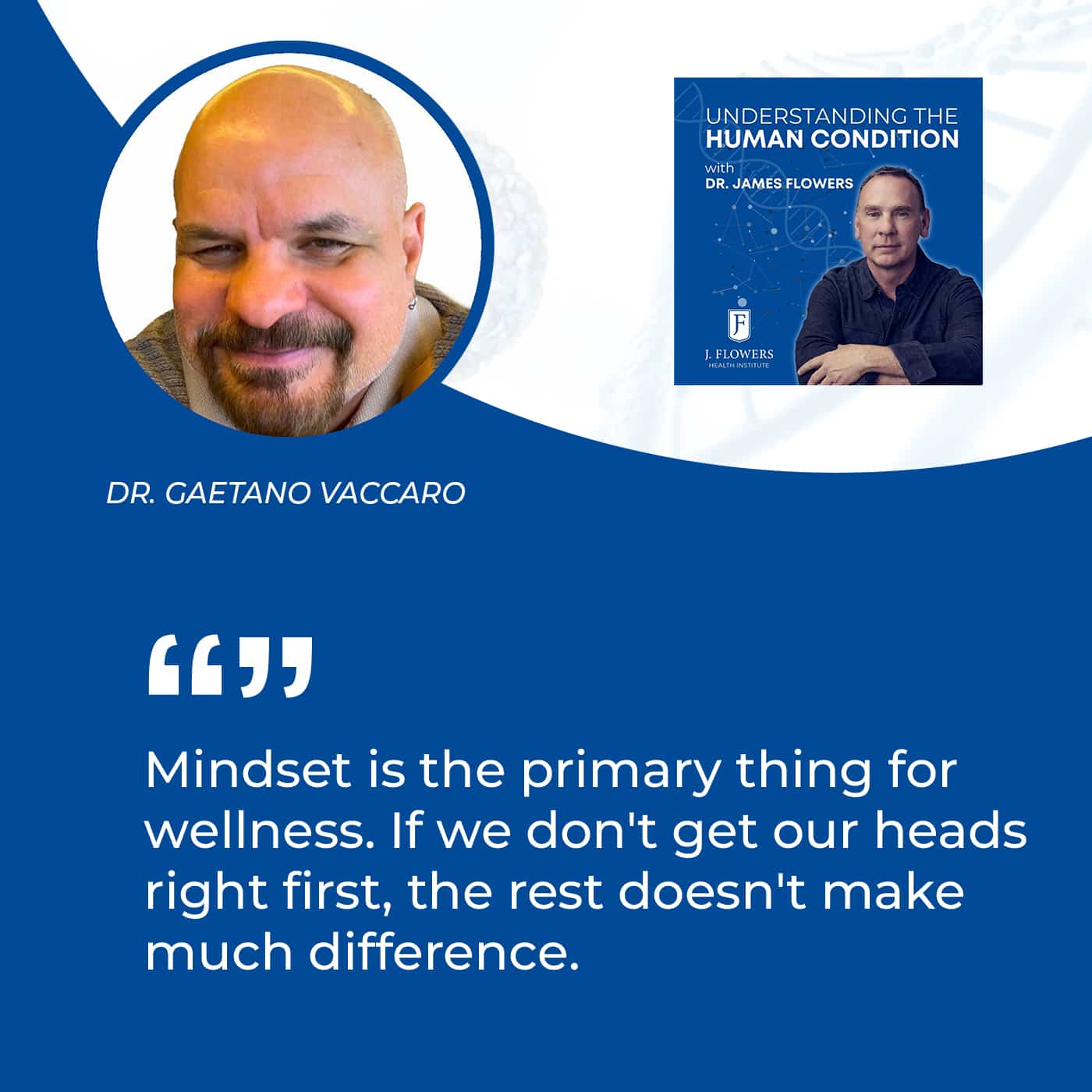
The Power Of Focus And Mindset
I agree. Having our head on straight as our parents used to say, is a wise thing that they said to us. It’s that mindset of one team to make a lifestyle change. It goes a million miles. Talking about having the right mindset and positivity, taking care of others, and having community. You may post that your friend Coyote Jackson was talking to you about a group of people. I enjoy working with you and talking to you about wellness and longevity. I want to continue to do that and grow both of our practices in a way that we bring more of that in. Thank you for talking about that, but I want to wrap it up by this amazing post that you made after Coyote Jackson and you had a conversation.
It was very interesting because as we know, we focus on expansion. It’s like, if our mind is trapped in fear and we’re focusing on that. First of all, we’re agitating our body with all the fear hormones so we’re going to feel worse. It’s like I always tell people, not only do you get to choose what you think about and focus on. You have to choose what you focus on because the negative bias of the brain is always going to default to fear and trying to keep us in protection mode.
One of the things that Coyote has developed as part of his Buddhist training is this idea of focusing on loving kindness. He talked about if you are scared or anxious or angry or even fearful about the future. Remember this, practice this loving kindness wins. It’s like Martin Luther King talks about, the ark of the moral universe is long but it bends towards justice. We get what we believe and that’s not just a psychological thing.
I think our brain’s perception is organized around, if you believe certain things, that’s what you’re going to notice in the environment. Even in the midst of a lot of other positive things. One of the things we’re focusing on for the next couple of months is the idea of loving kindness wins. Not only ultimately, but also just within ourselves. Am I going to come from this mindset of just being in loving kindness?
If you believe certain things, that’s what you’re going to notice in the environment even in the midst of a lot of other positive things.
That’s amazing and it’s so timely. Wherever we are in the world and whatever we stand for in the world, whatever it is, if we focus on loving kindness wins. We’re all going to win and we’re all going to feel better. I agree. Gaetano Vaccaro, thank you so much for being here. I wish we had another hour to do this.
Maybe we’ll do it again.
Let’s maybe create a series of these. It would be amazing. I look forward to talking to you offline and continuing our discussions about wellness and longevity. Thank you for being my personal friend and also my professional colleague. I love working with you. Folks, Dr. Vaccaro is an amazing psychologist in Palm Springs. Dr. Vaccaro, do you have a way for people to reach out to you and ask questions?
I have my personal email. I’m happy for people to send me stuff through my email. It’s [email protected].
I love it. I email that all the time and if you want to reach J. Flowers Health Institute, it is JFlowersHealth.com. All of our contacts are on that website. Gaetano, thank you, again. I hope you have a wonderful day. I know you’re super busy in your life, so thank you for taking the time to do this with me and talk about wellness, longevity, and positivity. I’d love to meet Coyote Jackson next time I’m out.
The next time you’re here.
Thank you so much. Folks, thank you so much for watching and reading. Take care.
Important Links
- Constellation Behavioral Health
- Flowers Health Institute
- Coyote Jackson
- Love, Medicine and Miracles
- [email protected]
About Gaetano Vaccaro
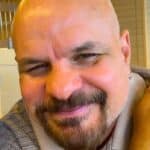 Gaetano Vaccaro, PhD is a Licensed Clinical Psychologist, and Certified Sex Addiction Therapist (CSAT).
Gaetano Vaccaro, PhD is a Licensed Clinical Psychologist, and Certified Sex Addiction Therapist (CSAT).
Dr. Vaccaro has over thirty years of experience in the addiction recovery industry as a psychotherapist, executive director, clinical director, consultant for program design, and workshop facilitator. Dr. Vaccaro is currently the National Clinical Advisor for Constellation Behavioral Health.
He also maintains a private practice in Palm Springs, California and He has recounted presented at the 2024 Westcoast and Cape Cod Symposia on Addictive Disorders. Dr. Vaccaro is a proficient facilitator and he develops workshops and retreats on personal growth and development.


